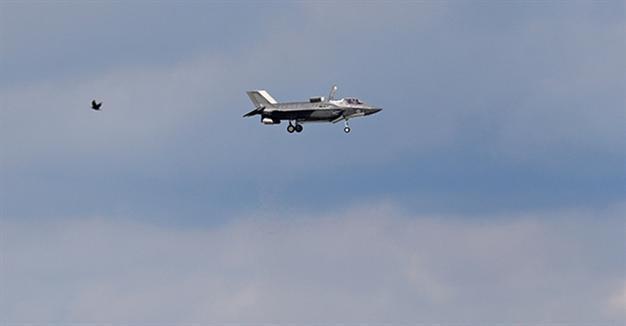US Air Force declares first squadron of F-35 jets combat-ready
WASHINGTON – Reuters

AFP photo
The U.S. Air Force has declared an initial squadron of Lockheed Martin Corp F-35A fighter jets ready for combat, marking a major milestone for a program that has faced cost overruns and delays.
The action is another achievement for the $379 billion program, the Pentagon’s largest weapons project. The Air Force’s decision follows one by the U.S. Marine Corps in July 2015 declaring a first squadron of F-35s ready for combat.
“The U.S. Air Force decision to make the 15 F-35As ... combat ready sends a simple and powerful message to America’s friends and foes alike - the F-35 can do its mission,” the program’s chief, Air Force Lieutenant General Chris Bogdan, said in a statement.
Dan Grazier, a fellow of the Project On Government Oversight, said, however, “This is nothing but a public relations stunt.” He added that it would not be possible to know if the F-35 jets were ready for combat until after initial operational testing.
“The program is not doing everything they wanted it to do ... But they’re at a point now where it is stabilizing and so it is progress,” said Todd Harrison, a defense analyst at the Center for Strategic and International Studies.
Officials say the F-35 will give the U.S. military the ability to detect enemy aircraft and other threats far beyond current ranges, allowing the jets to strike targets and disappear long before they are detected.
The U.S. Air Force plans to buy a total of 1,763 F-35A conventional takeoff and landing jets in coming years and will operate the largest F-35 fleet in the world.
Air Force General Herbert Carlisle, commander of Air Combat Command, said work to upgrade the jet would continue in areas such as software, making the displays more intuitive and boosting the ability to share information between aircraft.
The aircraft could provide basic air support at this point but did not have everything the final version would, such as an infrared pointer, Carlisle said, adding that he would try to get the jets deployed to Europe and the Pacific within 18 months.
Lockheed is building three models of the F-35 Lightning II for the U.S. military and 10 countries that have already ordered the jets: Britain, Australia, Norway, Italy, Turkey, Denmark, the Netherlands, Israel, South Korea and Japan.
The Pentagon’s F-35 program office said it remained in negotiations with Lockheed over long-delayed contracts for the next two batches of F-35 jets, deals worth about $15 billion.
“We’re seeking a fair deal for the F-35 enterprise and industry,” said F-35 program spokesman Joe DellaVedova.
The program, launched in 2001, has made strides in recent years after huge cost overruns and technical problems that sent the project’s cost up nearly 70 percent.
Problems with the fighter jet included issues with the radar software and increased risk of neck injury to lower-weight pilots when they ejected from the aircraft.
Industry and U.S. defense officials say they are working hard to continue driving down the cost of the new warplanes to $85 million per plane by 2019, as well as the cost of operating them.
Senator John McCain, the Republican chairman of the Armed Services Committee, said he welcomed the announcement but made clear he intended to keep a close eye on the hugely expensive program.
“The Senate Armed Services Committee will continue to exercise rigorous oversight of the Joint Strike Fighter program’s long-delayed System Development and Demonstration phase as well as the start of the operational test and evaluation phase,” McCain said in a statement.
